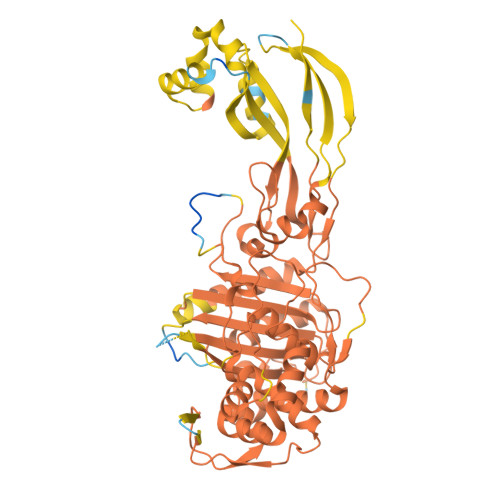Structural basis of Pseudomonas aeruginosa penicillin binding protein 3 inhibition by the siderophore-antibiotic cefiderocol.
Smith, H.G., Basak, S., Aniebok, V., Beech, M.J., Alshref, F.M., Allen, M.D., Farley, A.J.M., Schofield, C.J.(2024) Chem Sci 15: 16928-16937
- PubMed: 39328188
- DOI: https://doi.org/10.1039/d4sc04937c
- Primary Citation of Related Structures:
9FZ7, 9FZ8, 9FZE, 9FZO, 9FZP - PubMed Abstract:
The breakthrough cephalosporin cefiderocol, approved for clinical use in 2019, has activity against many Gram-negative bacteria. The catechol group of cefiderocol enables it to efficiently enter bacterial cells via the iron/siderophore transport system thereby reducing resistance due to porin channel mutations and efflux pump upregulation. Limited information is reported regarding the binding of cefiderocol to its key proposed target, the transpeptidase penicillin binding protein 3 (PBP3). We report studies on the reaction of cefiderocol and the related cephalosporins ceftazidime and cefepime with Pseudomonas aeruginosa PBP3, including inhibition measurements, protein observed mass spectrometry, and X-ray crystallography. The three cephalosporins form analogous 3-exomethylene products with P. aeruginosa PBP3 following elimination of the C3' side chain. pIC 50 and k inact / K i measurements with isolated PBP3 imply ceftazidime and cefiderocol react less efficiently than cefepime and, in particular, meropenem with P. aeruginosa PBP3. Crystal structures inform on conserved and different interactions involved in binding of the three cephalosporins and meropenem to P. aeruginosa PBP3. The results will aid development of cephalosporins with improved PBP3 inhibition properties.
Organizational Affiliation:
Department of Chemistry, University of Oxford 12 Mansfield Road Oxford OX1 3TA UK [email protected].














